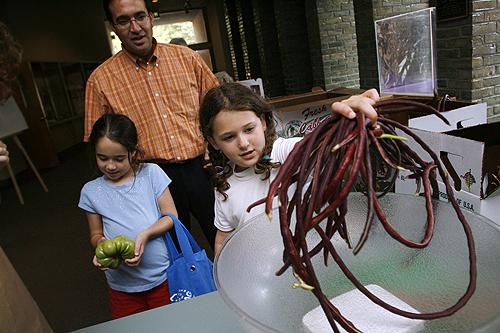Food nourishes faith in agriculture groups fusing produce, ideals

Atara Zibitt, 7, weighs a hand full of red noodle beans as Howie Slomka, center, and daughter Liana Slomka, 7, wait in line while picking up their allotment of produce at Congregation Shearith Israel. THE ASSOCIATED PRESS, JOHN AMIS
Aug 21, 2007
On Wednesday evenings, faith and produce mingle at Atlanta’s Congregation Shearith Israel synagogue.
As parents gather to collect their children from Hebrew school or attend lectures, many also pass through the social hall, where they collect boxes of tomatoes, peaches, spinach and other organic produce.
It’s a blending of physical and spiritual sustenance that Rabbi Hillel Norry calls the best of Jewish values in action, and it’s just one of a growing number of faith-based community supported agriculture (or CSA) programs nationwide.
“We’re taking Jewish ideals of justice, economics, health, ecology, well-being and responsibility and putting them to work in the real world in a way that makes our lives and the life of the farmer better,” Norry says.
Fueled by growing interest in local food, CSAs have gone from just a few during the 1980’s to about 2,000 today. They operate on the simple premise of enlisting community support for area farms, then rewarding that support with food.
Get The Daily Illini in your inbox!
In most cases, people buy shares in participating farms, paying a set amount upfront. For the Atlanta group, it’s $700, though most CSAs cost between $400 and $600. In exchange, the farmer delivers to them a weekly share of the crops, usually for 20 weeks or more. Consumers get good, local food; farmers get guaranteed income.
Of course, interest is contingent on caring about where one’s food comes from. But for some faiths, that concern is built in. Many Jews and Muslims follow kosher and halal tenets, which detail how foods can be raised, processed and stored.
For others, it’s a natural extension of existing concerns about the ethics and values of food and eating, issues important to groups such as the Iowa-based National Catholic Rural Life Conference.
Under the group’s leadership, several organic farms with CSAs have been established on or are planned for church-owned land in Illinois, Indiana, Massachusetts, Michigan, New Hampshire, New Jersey, New York and Ohio, many of them operated by orders of monks and nuns.
“We’re still at the beginning of this ethical food system revolution,” says Brother David Andrews, the conference’s executive director. “Only a small percentage of our institutions and dioceses are doing this, but as consciousness of things like global warming, the obesity epidemic and diabetes grow, support for this will continue to grow.”





